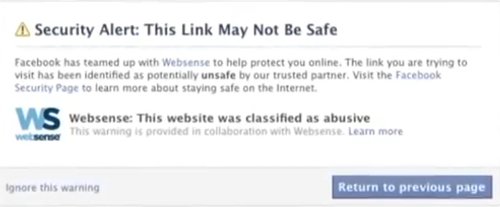Facebook has partnered with a web security company to automatically scan all outgoing links that appear on the site. It’s an attempt to combat spam links that understandably flourish on Facebook.
The tool being used is the impressively sounding Websense ThreatSeeker Cloud powered by the Advanced Classification Engine. (There’s a TRITON in there somewhere as well.) In practice it’s a similar tool to that which is used by several search engines and browsers: when a user clicks on the link, it’s checked against a database and, if it looks suspicious, the user is given the choice of proceeding, going back to Facebook, or getting more technical details. The button to go back is intentionally made more prominent than the one to follow the link regardless.
How successful this is in practice depends on the accuracy of the database, but in principle it certainly seems a sensible idea. With 800 million users, there’ll be plenty of people on Facebook who either take no security precautions whatsoever, or have installed so many bogus antivirus applications that their screen is flooded with toolbars to the point that the main window looks like the view through a suit of armor visor.
The partnership also involves Websense producing a Facebook app named Defensio. It’s for people who run a Facebook page (as a opposed to a personal profile) and allows them to block links to malicious content, as well as optionally filtering links to particular topics.
In what’s probably not a coincidence, the announcement came just as Websense revealed the results of a survey into office staff computer use. As well as reporting “Facebook users growing at 41% year over year” (more poking = less aerobics?), it claimed that 63 percent of firms agreed that employee use of social media was a risk to the organization’s security, but that only 29 percent said they had adequate security measures. What percentage of those responding had any idea what they were talking about isn’t known.

